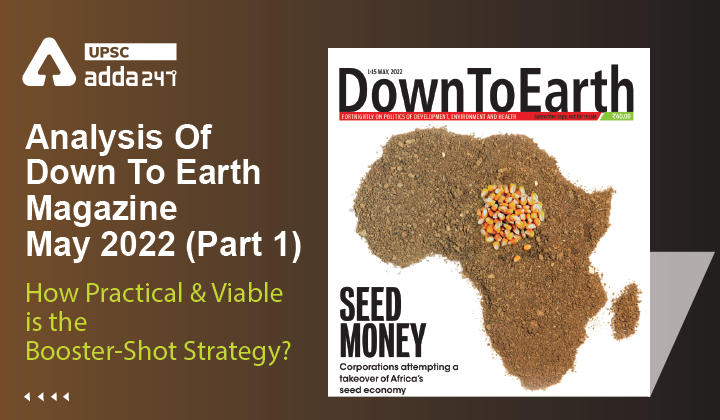Table of Contents
Analysis Of Down To Earth Magazine: ”How Practical & Viable is the Booster-Shot Strategy?”
Relevance
”GS 3: Health”
Introduction
- India has recently extended access to a third dose of covid-19 vaccine to all adults who have received the second shot nine months earlier.
- The vaccine, dubbed a precautionary dose, had been available to those above 60 years and healthcare workers since January 10, this year.
- With the announcement, India joins some 100 countries that have since July 2021 begun rolling out booster shots.
What is Booster Dose?
- A COVID booster shot is an additional dose or doses of a vaccine given after the protection provided by the original shot(s) has begun to decrease over time.
- COVID-19 vaccine boosters can further enhance or restore protection that might have waned over time after your primary series vaccination.
- People are protected best from severe COVID-19 illness when they stay up to date with their COVID-19 vaccines, which includes a booster for many people.
What is the difference between a booster and an additional dose?
- A COVID-19 booster is given when a person has completed their vaccine series, and protection against the virus has decreased over time.
- An additional dose is administered to people with moderately to severely compromised immune systems. This additional dose is intended to improve immunocompromised people’s response to their initial vaccine series.
What does the data show?
- There is enough study showing a steady decline of immunity among vaccinated individuals emerging variants, breakthrough infections.
- For example, study published in New England Journal of Medicine in February 2022 finds that protection after two shots of Pfizer Inc’s vaccine waned considerably after six months.
How do New Variants impact vaccine effectiveness?
- New variants also impact vaccine effectiveness. The spike protein of the virus has certain prominent bulges, and after vaccination, antibodies bind to these.
- The spike protein of the Omicron variant lost many bulges and got new ones in other parts of the molecule, making it difficult for the antibodies to neutralise the virus.
- If in such a scenario only 25 per cent of antibodies are effective enough to protect the body, they need to be enhanced with boosters.
Viability Of Booster Shot?
- There is serious uncertainty whether a third dose will be enough to confer lasting immunity against Omicron and emerging variants in most people — or a fourth dose, or even regular boosters, will be needed, as they are for influenza.
- The answer depends on the desired effect — whether boosters are intended to prevent infections and slow transmission of the virus, or whether the goal is to reduce severe disease and keep people out of hospital.
- Others point to evidence that extra doses could broaden the immune response enough to recognize new variants.
Limitations of boosters
- Omicron changed the thinking around boosters that’s because, faced with the variant, people previously regarded as fully vaccinated now have “an antibody response that is insufficient to prevent infections”.
- As Omicron outbreaks have spread, boosters have been used to ramp up levels of neutralizing antibodies, curbing cases and easing strain on hospitals but the concern is that boosters don’t block infections for long.
Conclusion
Because protection from boosters might be short-lived, rolling out endless doses potentially at the expense of immunizing unvaccinated people in low-income nations is not a “viable or reasonable” long-term global strategy.



 TSPSC Group 1 Question Paper 2024, Downl...
TSPSC Group 1 Question Paper 2024, Downl...
 TSPSC Group 1 Answer key 2024 Out, Downl...
TSPSC Group 1 Answer key 2024 Out, Downl...
 UPSC Prelims 2024 Question Paper, Downlo...
UPSC Prelims 2024 Question Paper, Downlo...




